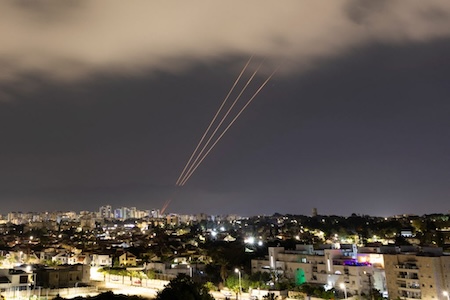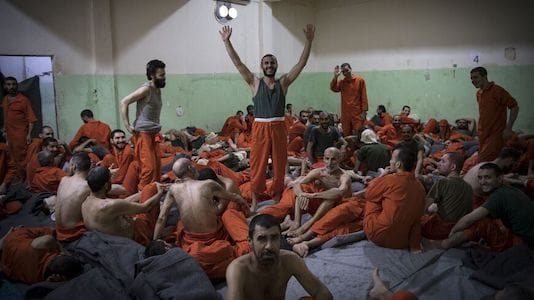 The Centre for Mediterranean, Middle East and Islamic Studies (CEMMIS) of the Department of Political Science and International Relations of the University of the Peloponnese organises the next e-lecture in the series The Middle East after the Gaza war:
The Centre for Mediterranean, Middle East and Islamic Studies (CEMMIS) of the Department of Political Science and International Relations of the University of the Peloponnese organises the next e-lecture in the series The Middle East after the Gaza war:
Mehdi Beyad on
"Iran After the Flood: Regional and Strategic Considerations"
 The death of President Ebrahim Raisi in a helicopter crash on May 19 triggered snap elections in Iran and brought pro-reform Masoud Pezeshkian to presidency. This article presents an overview of the election outcome and its implication for Iranian politics, economy and society.
The death of President Ebrahim Raisi in a helicopter crash on May 19 triggered snap elections in Iran and brought pro-reform Masoud Pezeshkian to presidency. This article presents an overview of the election outcome and its implication for Iranian politics, economy and society.
 The Centre for Mediterranean, Middle East and Islamic Studies (CEMMIS) of the Department of Political Science and International relations of the University of the Peloponnese organises the next e-lecture in the series The Middle East after the Gaza war:
The Centre for Mediterranean, Middle East and Islamic Studies (CEMMIS) of the Department of Political Science and International relations of the University of the Peloponnese organises the next e-lecture in the series The Middle East after the Gaza war:
Rahman Ghahremanpour on "Iran's Strategic Insight"
Both the e-lecture and the discussion will be conducted in English.
The online event will take place on Thursday, May 23 (7:30 p.m. Athens time, UTC+3).
You can watch the lecture live via Webex or the following day on our Youtube channel.
WEBEX: https://upelop.webex.com/upelop/j.php?MTID=mf4002f7bdea2e11ef293fab8fe8069f2
YOUTUBE: https://www.youtube.com/@CEMMIS11
 Η επίθεση του Ισραήλ στο ιρανικό προξενείο της Δαμασκού και η δολοφονία πέντε ανώτατων και ανώτερων Ιρανών αξιωματικών μπορεί να αποδοθεί σε τρεις λόγους που είναι σε μεγάλο βαθμό αλληλένδετοι. Πρώτον, είναι πιθανό ότι αποτελεί προοίμιο μιας γενικής επίθεσης του Ισραήλ κατά της Χεζμπολάχ ανάλογη με αυτή εναντίον της Χαμάς μετά το τέλος της επίθεσης στη Γάζα. Η δολοφονία των Ιρανών ανώτατων αξιωματικών που ήταν υπεύθυνοι για τη Συρία, τον Λίβανο και την Παλαιστίνη αποδυναμώνει πολύ την επιτελική αποτελεσματικότητα της Χεζμπολάχ τους επόμενους μήνες. Δεύτερον, η επίθεση είναι ένα μήνυμα προς τις ΗΠΑ μετά την στάση τους στο Συμβούλιο Ασφαλείας του ΟΗΕ. Το μήνυμα είναι ότι το Ισραήλ θέτει τις στρατηγικές προτεραιότητες στη Μέση Ανατολή και όχι η Ουάσιγκτον.
Η επίθεση του Ισραήλ στο ιρανικό προξενείο της Δαμασκού και η δολοφονία πέντε ανώτατων και ανώτερων Ιρανών αξιωματικών μπορεί να αποδοθεί σε τρεις λόγους που είναι σε μεγάλο βαθμό αλληλένδετοι. Πρώτον, είναι πιθανό ότι αποτελεί προοίμιο μιας γενικής επίθεσης του Ισραήλ κατά της Χεζμπολάχ ανάλογη με αυτή εναντίον της Χαμάς μετά το τέλος της επίθεσης στη Γάζα. Η δολοφονία των Ιρανών ανώτατων αξιωματικών που ήταν υπεύθυνοι για τη Συρία, τον Λίβανο και την Παλαιστίνη αποδυναμώνει πολύ την επιτελική αποτελεσματικότητα της Χεζμπολάχ τους επόμενους μήνες. Δεύτερον, η επίθεση είναι ένα μήνυμα προς τις ΗΠΑ μετά την στάση τους στο Συμβούλιο Ασφαλείας του ΟΗΕ. Το μήνυμα είναι ότι το Ισραήλ θέτει τις στρατηγικές προτεραιότητες στη Μέση Ανατολή και όχι η Ουάσιγκτον.

The film industry in Iran is politicized and innovative. Τhe events of the Green Movement (2009-2011) deeply affected Iranian society and its film industry. While the Iranian government’s brutality reached the international audience through social media and internet reportage, film directors presented their political change through their films, which were greeted by the international film festivals.
 As the Russian invasion of Ukraine continues in full gear, contrary to the steadfast reactions of the western world, the regional responses from the Middle East paint a different picture. Having initially been caught off-guard with the intensifying tag between Russia and the west, most ‘heavyweight’ MENA countries have adopted a ‘sit tight and assess’ approach. Longstanding partners of the west are balancing their reactions in order to minimize the risks stemming from overtly picking sides in a conflict that they increasingly see as not their own. On the region’s eastern flank, Iran too, walks a thin line.
As the Russian invasion of Ukraine continues in full gear, contrary to the steadfast reactions of the western world, the regional responses from the Middle East paint a different picture. Having initially been caught off-guard with the intensifying tag between Russia and the west, most ‘heavyweight’ MENA countries have adopted a ‘sit tight and assess’ approach. Longstanding partners of the west are balancing their reactions in order to minimize the risks stemming from overtly picking sides in a conflict that they increasingly see as not their own. On the region’s eastern flank, Iran too, walks a thin line.
 Even though, during the past year, developments in Syria have entered a stabilization trajectory, the country remains fragmented and a “playground” where different regional and national interests collide. The Assad regime has managed to maintain and extend its control in most of the Syrian territories around Damascus and in the south. However, there are still challenges from opposition forces in the northwest, the Kurdish-controlled areas in the northeast and a re-emerging ISIS threat looming both from previously ISIS-controlled enclaves as well as prisons and camps.[1] At the same time, lines are blurred in regional alliances, such as the one between Russia and Iran, as the players attempt to consolidate their power at each other’s expense. What will 2022 look like for Syria and what are the imminent threats for the country’s sovereignty?
Even though, during the past year, developments in Syria have entered a stabilization trajectory, the country remains fragmented and a “playground” where different regional and national interests collide. The Assad regime has managed to maintain and extend its control in most of the Syrian territories around Damascus and in the south. However, there are still challenges from opposition forces in the northwest, the Kurdish-controlled areas in the northeast and a re-emerging ISIS threat looming both from previously ISIS-controlled enclaves as well as prisons and camps.[1] At the same time, lines are blurred in regional alliances, such as the one between Russia and Iran, as the players attempt to consolidate their power at each other’s expense. What will 2022 look like for Syria and what are the imminent threats for the country’s sovereignty?
Το Κέντρο Μεσογειακών,Μεσανατολικών και Ισλαμικών Σπουδών φιλοξενεί πληθώρα διαφορετικών απόψεων στα πλαίσια του ελεύθερου ακαδημαϊκού διαλόγου. Οι απόψεις αυτές δεν αντανακλούν υποχρεωτικά τις απόψεις του Κέντρου. Η χρήση και αναπαραγωγή οπτικοακουστικού υλικού για τις ανάγκες της ιστοσελίδας του ΚΕΜΜΙΣ γίνεται για ενημερωτικούς, ακαδημαϊκούς και μη κερδοσκοπικούς σκοπούς κατά τα προβλεπόμενα του Νόμου 2121/1993 (ΦΕΚ Α' 25/4-3-1993) περί της προστασίας της πνευματικής ιδιοκτησίας, καθώς και του άρ.8 του Νόμου 2557/1997 (ΦΕΚ Α' 271/1997).

